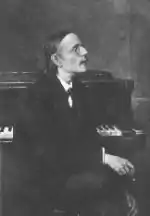Peter Cornelius
Carl August Peter Cornelius (24 December 1824 – 26 October 1874) was a German composer, writer about music, poet and translator.

Life
He was born in Mainz to Carl Joseph Gerhard (1793–1843) and Friederike (1789–1867) Cornelius, actors in Mainz and Wiesbaden. From an early age he played the violin and composed, eventually studying with Tekla Griebel-Wandall and composition with Heinrich Esser in 1841. He lived with his painter uncle Peter von Cornelius in Berlin from 1844 to 1852,[1] and during this time he met prominent figures such as Alexander von Humboldt, the Brothers Grimm, Friedrich Rückert and Felix Mendelssohn.
Cornelius's first mature works (including the opera Der Barbier von Bagdad) were composed during his brief stay in Weimar (1852–1858). His next place of residence was Vienna, where he lived for five years. It was in Vienna that Cornelius began a friendship with Richard Wagner. At the latter's behest, Cornelius moved to Munich in 1864, where he took a wife and fathered four children.[1]
In Britain to this day, Cornelius's best-known work is "The Three Kings", a song for voice and piano in which the soloist sings "Three Kings from Persian lands afar ...", while from the piano is heard the chorale tune of Philipp Nicolai, Wie schön leuchtet der Morgenstern ("How brightly shines the morning star") underneath. An arrangement by Ivor Atkins of "The Three Kings" for solo voice and choir is included in the first volume of the popular David Willcocks and Reginald Jacques compilation Carols for Choirs.
During his last few years in Berlin, Cornelius wrote music criticism for several major Berlin journals and entered into friendships with Joseph von Eichendorff, Paul Heyse and Hans von Bülow. Despite his long-standing association with Wagner and Franz Liszt (the latter on occasion sought Cornelius's advice when it came to matters of orchestration), Cornelius's relations with the so-called "New German School" of composition were sometimes rocky. For instance, he did not attend the premiere of Tristan und Isolde, using the premiere of his own opera Der Cid as an excuse.
Cornelius's third and final operatic project, Gunlöd, based on the Norse eddas, was left incomplete at his death (from diabetes) in Mainz. He was buried in the city's Hauptfriedhof, and his grave can still be seen there.
Selected works
- Der Barbier von Bagdad, opera buffa (1858)
- Brautlieder (1856)
- Weihnachtslieder, Op. 8 (1856)
- Der Cid, opera (1865)
- Stabat mater for soloists, chorus and orchestra (1849)
- Requiem ("Seele, vergiß sie nicht"), after a poem of Hebbel (1872)
- String quartets
- Gunlöd, unfinished opera in three acts (1869–1874) after the Edda (1906)
- Mass in D minor, CWV 91 for two soloists, chorus and organ, strings
References
- Attribution
- Chisholm, Hugh, ed. (1911). . Encyclopædia Britannica (11th ed.). Cambridge University Press.CS1 maint: ref=harv (link)
External links
- Works by or about Peter Cornelius at Internet Archive
- Works by Peter Cornelius at LibriVox (public domain audiobooks)

- Free scores by Peter Cornelius at the International Music Score Library Project (IMSLP)
- Free scores by Peter Cornelius in the Choral Public Domain Library (ChoralWiki)
- Free scores at the Mutopia Project